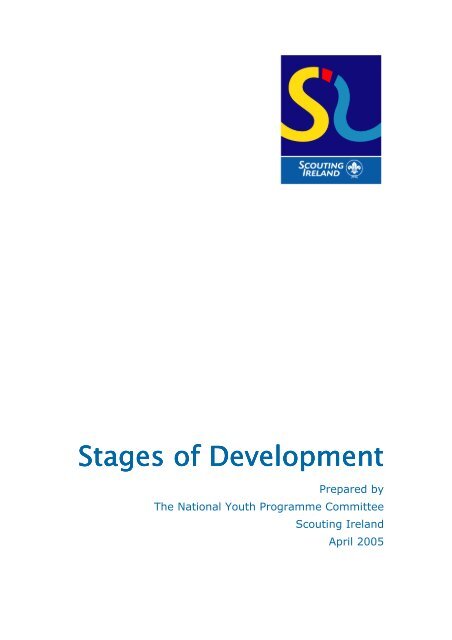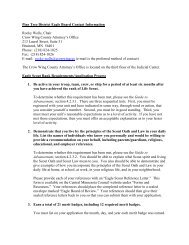stages of development
stages of development
stages of development
Create successful ePaper yourself
Turn your PDF publications into a flip-book with our unique Google optimized e-Paper software.
Stages <strong>of</strong> Development<br />
Prepared by<br />
The National Youth Programme Committee<br />
Scouting Ireland<br />
April 2005
Scouting Ireland<br />
is built on a shared respect for the<br />
uniqueness <strong>of</strong> young people.<br />
We believe in the abilities <strong>of</strong> young<br />
people and their wish to discover and<br />
harness their own potential.<br />
We help them achieve this by<br />
providing them with the support and<br />
encouragement they need.<br />
“We accept each young person as he or she is – a unique<br />
human being with his or her own personal background<br />
and experience <strong>of</strong> life thus far, variations in needs,<br />
capacities, interests and pace <strong>of</strong> <strong>development</strong>.”<br />
‘Scouting: An Educational System’ WOSM 1998
This document has been produced by the National Youth Programme<br />
Committee <strong>of</strong> Scouting Ireland, with the assistance <strong>of</strong> the Programme<br />
Review Team. Valuable input and guidance was provided by –<br />
Dr. Valerie O’Brien; BSocSc, MSc(LSE), PhD, Dip Family Therapy, PhD;<br />
Dept. <strong>of</strong> Social Policy & Social Work, University College Dublin<br />
Dr. Jean White; BA, HDip(Ed), MSc(EDP), PhD; Children’s Research<br />
Centre, Trinity College Dublin<br />
Johanna Doherty; BA(QTS); Primary School Teacher<br />
Thérèse Courtney; BA, HDip(Ed); Post-Primary School Teacher<br />
Thérèse Bermingham; former European Scout Committee<br />
Stephen Oakes; BSc(Cur Occ); Occupational Therapist<br />
The experience <strong>of</strong> the National Youth Programme Committee<br />
membership also provided an input to this process.
Stages <strong>of</strong> Development<br />
The child is a busy active explorer and develops from within,<br />
based on their own innate capacities.<br />
• The young person’s sense <strong>of</strong> wonder and curiosity is a<br />
motivating factor in learning.<br />
• The young person’s existing knowledge and experience<br />
forms the base for learning.<br />
• Each individual has a different capacity for learning.<br />
• Each individual has a different learning style.<br />
• The young person is an active agent in his/her learning.<br />
Generally young people reach each <strong>development</strong>al stage in<br />
their own time. Community, culture and family situation all<br />
have an impact on the acquisition <strong>of</strong> <strong>development</strong>al <strong>stages</strong>.<br />
The young person’s immediate environment provides the<br />
context for their learning.<br />
• Young people need support in order to develop social<br />
and relationship skills.<br />
• Young people are looking for ways to assess and<br />
express their uniqueness.<br />
Scouting Ireland is a non-formal educational movement and<br />
as such we aim to teach people how to learn. When<br />
referring to education BP stated that it is “drawing out the<br />
individual boy and giving him the ambition and keenness to<br />
learn for himself”. How one learns to be in the world and<br />
how one learns ones values, is about a process <strong>of</strong> interaction<br />
with others. The Law and Promise provides us with the<br />
framework to achieve this aspiration.<br />
As part <strong>of</strong> the RAP process a number <strong>of</strong> pr<strong>of</strong>essionals were<br />
invited to present on the <strong>development</strong>al <strong>stages</strong> in a child’s
life. Members <strong>of</strong> the National Youth Programme Committee<br />
added their own experience <strong>of</strong> the <strong>development</strong> <strong>of</strong> young<br />
people through Scouting. As this information was<br />
presented, it was grouped according to the various areas <strong>of</strong><br />
growth from the aim <strong>of</strong> Scouting Ireland and against the<br />
approximate ages that the various <strong>development</strong>s occur.<br />
This information is presented in condensed form in the<br />
charts that follow.<br />
The pr<strong>of</strong>essionals pointed out that theory lags behind the<br />
lived reality and is <strong>of</strong>ten taken out <strong>of</strong> context, that when<br />
considering any theory one should be aware <strong>of</strong> when and<br />
where it was developed and then it should be used in light<br />
<strong>of</strong> the lived reality and should be time and culture specific.
Pre-Adolescence<br />
Age<br />
Character<br />
Physical<br />
Emotional<br />
7 - 9<br />
Young children need Form constancy and<br />
boundaries and depth perception<br />
stability imposed. maturing. Can see<br />
the parts and the<br />
whole <strong>of</strong> an object<br />
but not at the same<br />
time.<br />
Ego centric<br />
Creative thinking Spatial Perception<br />
can be suppressed beginning to<br />
(if it is not<br />
mature.<br />
developed before 11<br />
it will never fully<br />
develop).<br />
Exploring the<br />
external world.<br />
Seeing the potential.<br />
Beginning to be less<br />
egocentric more<br />
able to relate to<br />
others as different<br />
to ourselves.
Age<br />
Intellectual<br />
Social<br />
Spiritual<br />
7 - 9 Concrete operations<br />
(Piaget). Are able to<br />
engage in co-operative<br />
play and act on<br />
instructions. Can<br />
understand and work<br />
in a team. Attention<br />
and concentration are<br />
very important for<br />
learning and the<br />
<strong>development</strong> <strong>of</strong> the<br />
perception <strong>of</strong> events.<br />
Need to develop<br />
reasoning skills. Also<br />
need to encourage<br />
learning through<br />
movement. Becoming<br />
more independent in<br />
school, can look up<br />
own facts and reason<br />
through own decisions.<br />
Can give instruction<br />
based on own<br />
experience depending<br />
on task.<br />
Encourage to develop<br />
critical and creative<br />
thinking skills.<br />
Before the age <strong>of</strong> 7<br />
the child's ability to<br />
interact in social<br />
groups is limited<br />
therefore one <strong>of</strong><br />
the key elements <strong>of</strong><br />
the scout system<br />
the team/patrol<br />
system cannot be<br />
implemented.<br />
Ego centric, Social<br />
Interaction is<br />
important for<br />
<strong>development</strong>.<br />
Scaffolding<br />
(Vygotsky). More<br />
involved in<br />
extracurricular<br />
activities.<br />
Beginning to be<br />
less egocentric.<br />
Begin to develop<br />
boundaries.<br />
Communion<br />
Year. Beginning<br />
to understand<br />
family<br />
relationships.<br />
Starting to learn<br />
respect for<br />
others
Early Adolescence<br />
Age<br />
Character<br />
Physical<br />
Emotional<br />
10-13<br />
Begin to make the<br />
Onset <strong>of</strong> puberty.<br />
decision to stay or<br />
Motor and<br />
go. (Our numbers<br />
perceptual abilities<br />
historically drop at<br />
mature. Gravitating<br />
this age)<br />
towards same<br />
gender groups.<br />
Social groups<br />
become<br />
fragmented. New<br />
schools.<br />
Self understanding<br />
Intimacy and<br />
and self esteem<br />
loneliness are an<br />
really develops at 12.<br />
issue.<br />
Beginning to develop Interest in own<br />
and maintain bodies developing.<br />
personal boundaries<br />
and sense <strong>of</strong> stability.<br />
Concept <strong>of</strong> rebellion<br />
starting, slang<br />
language etc.<br />
identity with a<br />
group. Emotionally<br />
Labile. Esteem<br />
issues can be<br />
misinterpreted.
Age<br />
Intellectual<br />
Social<br />
Spiritual<br />
10-13<br />
Concrete problem<br />
solving.<br />
Transition from<br />
primary school.<br />
Looking for approval<br />
from peers.<br />
Extracurricular<br />
Confirmation / Bah<br />
school based<br />
Mitzvah Year.<br />
activities take up<br />
more time. Self<br />
Confidence is a big<br />
issues.<br />
Beginning to think in Fascination with<br />
a more abstract and idols.<br />
idealistic way. Future<br />
oriented thought<br />
problem resolution.
Adolescence<br />
Age<br />
Character<br />
Physical<br />
Emotional<br />
14-16<br />
Questioning<br />
Sexual maturity.<br />
Esteem issues play a<br />
themselves<br />
Interest in own and<br />
major part <strong>of</strong> daily<br />
(what do I want to be<br />
other bodies really<br />
life.<br />
like) trying out<br />
kicking in.<br />
different roles and<br />
beliefs.<br />
More reliant on<br />
Autonomy and<br />
friends than family.<br />
attachment very<br />
Hanging out.<br />
important. Parents<br />
beginning to lose<br />
some control.<br />
Adolescent problems<br />
Sexual intimacy<br />
Depression and<br />
become a real issue<br />
beginning to play a<br />
suicide, eating<br />
(drugs drink etc).<br />
bigger part in their<br />
disorders,<br />
Achieving identity is<br />
lives. Physical<br />
interrelationship<br />
the MAIN task <strong>of</strong><br />
maturity kicking in<br />
difficulties.<br />
adolescence.<br />
bringing physical<br />
identity issues<br />
(good and bad).
Age<br />
Intellectual<br />
Social<br />
Spiritual<br />
14-16 Begin to<br />
hypotheses make<br />
plans, form an<br />
objective point <strong>of</strong><br />
view, see things<br />
from another's<br />
point <strong>of</strong> view. Can<br />
see the validity <strong>of</strong><br />
others point <strong>of</strong><br />
view.<br />
Reflective thinking<br />
should be<br />
encouraged.<br />
Metacognition<br />
(thinking about<br />
thinking) begins.<br />
Have the ability to<br />
contribute and<br />
work within teams.<br />
Pressure <strong>of</strong> exams,<br />
which college to go<br />
to will I get the<br />
points etc can be<br />
significant.<br />
Beginning senior<br />
cycle in school,<br />
taking<br />
responsibility for<br />
own learning.<br />
Other clubs age<br />
groups become<br />
more important.<br />
Friends becoming<br />
more important<br />
than family.<br />
Develop a concept <strong>of</strong><br />
their own<br />
uniqueness.<br />
Uncertainty<br />
regarding their own<br />
identity.
Post Adolescence<br />
Age<br />
Character<br />
Physical<br />
Emotional<br />
17-20 Instances <strong>of</strong><br />
interpersonal<br />
complexity and their<br />
ability to deal with<br />
them has increased.<br />
Physical Growth<br />
Completed. Sexual<br />
intimacy playing a<br />
huge part in their<br />
lives.<br />
Relationships<br />
founded on<br />
intimacy and<br />
complementarity
Age<br />
Intellectual<br />
Social<br />
Spiritual<br />
17-20 Abstract thinking<br />
maturing. Ability<br />
to make plans etc.<br />
maturing. Ability<br />
to make mature<br />
and independent<br />
Judgements and<br />
decisions.<br />
Recognition <strong>of</strong><br />
enrichment due to<br />
accepting individual<br />
differences.<br />
Problem <strong>of</strong> Social<br />
and Pr<strong>of</strong>essional<br />
integration.<br />
Building a respect for<br />
the concept <strong>of</strong><br />
spirituality.<br />
Transition into<br />
college or working<br />
environment etc.
Pr<strong>of</strong>iles <strong>of</strong> Stages <strong>of</strong> Development<br />
The following pr<strong>of</strong>iles <strong>of</strong> young people at the various <strong>stages</strong><br />
<strong>of</strong> <strong>development</strong> are derived from the characteristics<br />
previously outlined –<br />
• Pre-Adolescence<br />
The Pre-Adolescent stage <strong>of</strong> <strong>development</strong> is also known<br />
as “late childhood”.<br />
It is characterised by a certain level <strong>of</strong> stability. Physical<br />
growth is slower. The child is at ease in their body. They<br />
have acquired the capacity for logical reasoning on<br />
concrete data, and demonstrate intellectual curiosity.<br />
It is the stage at which children learn to co-operate, to<br />
adapt to a group and be appreciated. They have the<br />
capacity to develop reciprocal exchanges in a group.<br />
They can imagine themselves in another person’s<br />
situation. They accept the authority <strong>of</strong> adults.<br />
Cooperation is the main theme <strong>of</strong> this stage <strong>of</strong><br />
<strong>development</strong>.<br />
• Early Adolescence<br />
The stability <strong>of</strong> Pre-Adolescence is disturbed in the Early<br />
Adolescent stage <strong>of</strong> <strong>development</strong>. This is a period <strong>of</strong><br />
transition (earlier among girls, later among boys)<br />
characterised by the occurrence <strong>of</strong> numerous changes,<br />
both on a personal level (an acceleration in physical<br />
growth, the onset <strong>of</strong> puberty, a new stage <strong>of</strong> logical<br />
reasoning) and on the social level (the end <strong>of</strong> primary
school and the beginning <strong>of</strong> secondary school in many<br />
countries).<br />
This is sometimes called “the crisis <strong>of</strong> early<br />
adolescence”, which is shown by the rejection <strong>of</strong><br />
childhood rules, the challenging <strong>of</strong> adult authority, the<br />
attraction towards smaller social groupings, etc.<br />
It is a period <strong>of</strong> opposition and rejection <strong>of</strong> previous<br />
identifications. Childhood rules and regulations are<br />
called into question. However the ability to create new<br />
rules through mutual consent appears. That announces<br />
the <strong>development</strong> <strong>of</strong> moral autonomy and the acceptance<br />
<strong>of</strong> moral principles as a way <strong>of</strong> sharing rights and<br />
responsibilities within a group.<br />
Transition is the main theme <strong>of</strong> this stage <strong>of</strong><br />
<strong>development</strong>.<br />
• Adolescence<br />
The Adolescent stage <strong>of</strong> <strong>development</strong> is reached with<br />
the acquisition <strong>of</strong> sexual maturity, the establishment <strong>of</strong><br />
gender identity and the <strong>development</strong> <strong>of</strong> abstract logical<br />
reasoning.<br />
However, the restructuring phase which started with<br />
puberty continues with a search for identity. It is a fairly<br />
unstable stage during which <strong>development</strong> rhythms vary<br />
widely depending on sex (maturity is reached more<br />
quickly by girls) and under the influence <strong>of</strong> social and<br />
cultural factors. It is at this stage that problems such as
depression, suicide, eating disorders and<br />
interrelationship difficulties can start to occur.<br />
Identity is the main theme <strong>of</strong> this stage <strong>of</strong> <strong>development</strong>.<br />
• Post Adolescence<br />
The Post Adolescent stage <strong>of</strong> <strong>development</strong>, also known<br />
as “youth”, is characterised by the completion <strong>of</strong> physical<br />
growth. Relationships are now founded on intimacy and<br />
complimentarity.<br />
The young person now has the ability to make mature<br />
and independent judgements and decisions. It is<br />
therefore at this stage that they face the challenge <strong>of</strong><br />
taking on adult roles and becoming fully integrated into<br />
society.<br />
Maturity and Departure is the main theme <strong>of</strong> this stage<br />
<strong>of</strong> <strong>development</strong>.






